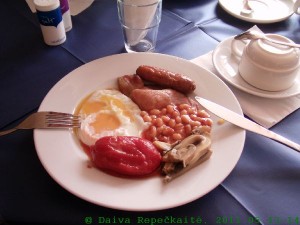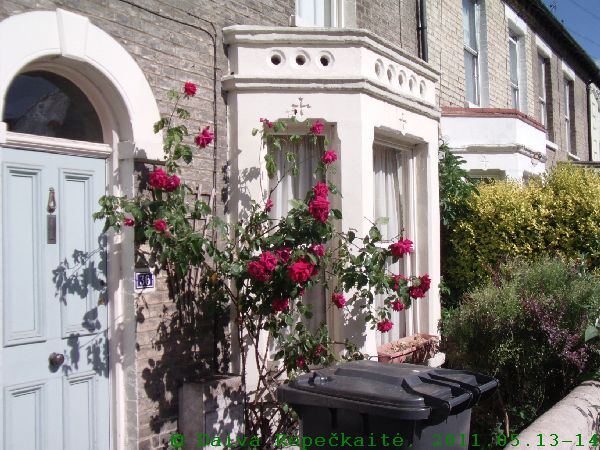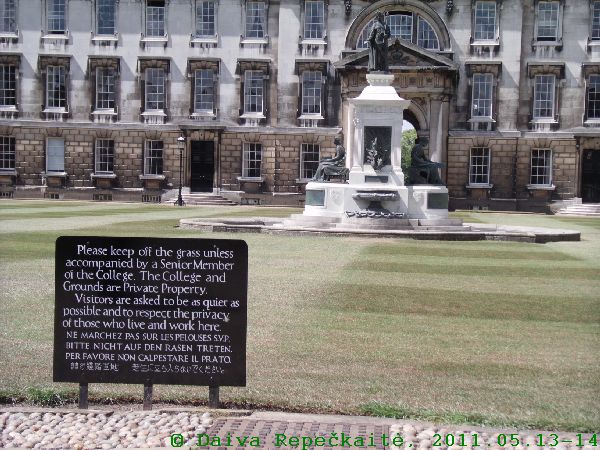Long time no see, right? I saw that this long absence cost me about 30% of my usual readership. But I hope to win all of you back, starting with impressions from England and Egypt, and finishing (for now) with interesting political events.
Months ago me and my colleague decided to attend an urban studies conference at Cambridge. The programme promised three interesting panels, one of them on exclusion and inclusion. Fed with hopes (we both are in an urgent need for a kick-start in our PhD studies) and watered with the perceived reputation of Cambridge, we set of to explore the wonderlands of pure academia. As well as catch a glimpse of London on the way back.
Personally, I was also very excited to visit an English-speaking country for the first time. Since perhaps 2005 half of my life is in English, but I had never heard this language used fully cross-generationally and across social classes. As you know, since Cafe Babel is a European platform, I blog in more or less British English, but use American in daily life. To prepare for England, I started reading this language blog.
We stayed at Fenners B&B, which is quite pricey for that type of place where many things do not work, but staff was at least nice enough to solve most of the problems. It is in the railway station area. Having to arrive there at night, we did not feel completely safe walking in not so well-lit streets. No need for that – here’s the first cultural difference for you. In most of Continental Europe, station areas have a bad reputation, typically associated with poverty, prostitution and drugs, sometimes crime as well. As we later learned, this is not the case in the UK.
Fenners, fortunately, had a ‘continental’ tap. Old-fashioned British taps arouse curiosity and have become a symbol of British peculiarity. While they are, as the blog quoted suggests, giving way to ‘modernity’, showers where water is either ice-cold or boiling hot still seem to be fairly common.
The concept of breakfast is a window to every culture. I have noted how Hungarians eat sweet paprika on bread, the Japanese may prefer cucumber salad in the morning. For Lithuanians, just like many Europeans, breakfast tends to be sweet: cereals with yoghurt, pancakes (if you live with your parents) or rolls satisfy the need to charge oneself with sugar for the day. Sandwiches are another option for many. Meanwhile, although not a daily meal, English breakfast has gained popularity as another cultural peculiarity. It consists of beans, mushrooms, a sausage and some ham. English breakfast is offered in hotels and restaurants in the UK and beyond as an opposite to ‘continental’. This island-centrism reveals itself in may situations. As me and my colleague were discussing how Europe-centrist it is to have a book on ‘African art’ (timeless!) thinner than ‘The Impressionists’, I noticed a tiny book, almost a brochure, named “Short introduction to Continental Philosophy”. If someone from Denmark to Greece is unsure that we, ‘continental’ Europeans, are one, go to Britain, they will prove it for you.

It may be a good idea to start from Cambridge if you want to dive into the world of cultural peculiarities. Cambridge itself looks like made of theatre decorations – very pretty and serene, but too silent to be a youthful city, centred around one of world’s leading universities. How is that?

Turns out that most of life happens in colleges – non-academic units where students live, eat, rest and socialise. The university mediates most of cultural life, such as concerts, networking events and various clubs. Student societies serve multiple purposes: they help students socialise and get to know each other, but they also carry the potential of turning these seemingly spontaneous contacts into useful network in the future. Students, it seems, feel pressured to always be presentable and impress others, to be sociable and to keep as many contacts as possible for their future careers. Life at Cambridge looks like offline Facebook.
Students have special gowns to enter evening events. Unable and seeing no point to change, students hang out in their gowns even after exiting university (I almost forgot: what’s ‘Exit’ on the Continent is a ‘Way out’ in the UK). You can see some of them riding their bikes or going from pub to pub. They must hurry – most alcohol in the UK is, apparently, consumed before 11 pm. Many bars do not bother to obtain licenses to sell alcohol after that hour. The best bars are said to be those which are run by students. Colleges have their own bars, which are difficult to enter for outsiders. In general, Cambridge can easily appear as an island of tradition and hierarchy. I was told students have to kneel when graduating. And voila – this is the most exotic aspect of Cambridge that I captured on camera:

Grass for senior academics only – this sounds like a [British] joke, but it is a part of the lifestyle in Cambridge.
Semi-locals say it is difficult to get proper coffee in the town, but good English tea is always available. We really liked ‘Indigo’ cafe, which looked cosy and cute, located next to a bookstore.
At night the population of Cambridge, academics or not, hit the bars. Streets are filled with men in thin shirts, behaving almost like their compatriots who go to the Baltics, and women with nearly non-existent skirts when it’s merely 12-16 degrees outside. Stumbling on their high heels, with their exposed legs and barely covered breasts almost blue from cold, they are not exactly embodiments of elegance, but it’s nice that in this environment people seem to not feel any more pressure to be presentable and classy. Or maybe they do – maybe drunken photos on Facebook are a way to gain popularity.
Cambridge is a small town with a kind of social island – the university. But to experience its small-town character, it can be a good idea to simply walk straight until there are no more people in university gowns, and it becomes obvious that people who live there most probably service the university, but are definitely not academics. There are places with simple bars and simple conversations, several sorts of English ale and legendary bar food. There are little yards with roses too.
Ah, did I almost forget the academic part of the trip? From discussions about such spellchecker’s nightmares as ‘iconicity’ to detailed accounts of shopkeepers’ memories in Nicosia, the conference was a glimpse to the world of pure academia, one that we rarely see in Lithuania. Where people take their research mega-seriously. It is exciting to see all these people with opportunities to do what they want under the supervision of leading scholars in the field. I wish them best luck and would like to see more of their conferences, even if not very applicable to what I do on a daily basis.
Some quick tips for Cambridge:
- Seeing university – only with an insider. Getting inside a college is priceless, it’s not possible to feel the atmosphere otherwise.
- Accommodation – low value for money, look for alternatives in advance.
- Buying books – copy titles and order on Amazon.
- Politeness – everyone takes time for small talk rather than mere ‘hello’.
- Transport from airport(s) – order in advance, e.g. on www.nationalexpress.com
- Food – good question…
- Socialising – people seem friendly and used to spontaneous ‘small talk’, as well as to a wide variety of accents
- Clothing – if you don’t have a university gown, anything goes

